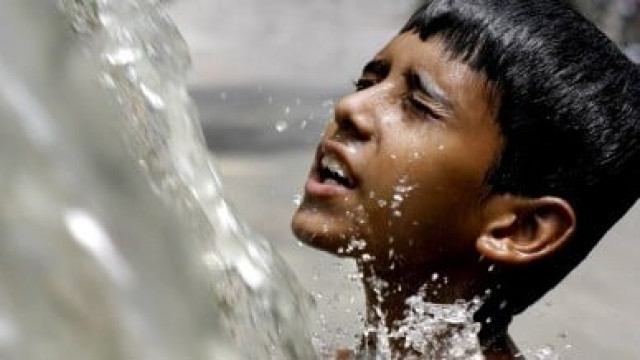Record number of heat stroke victims

Polyclinic alone has received about 32 patients in the past 48 hours, Dr Sharif Astori, Polyclinic’s Spokesperson told The Express Tribune on Tuesday. “This is the highest number of stroke patients that has ever come to the hospital for treatment,” he added. The hospital has had to start a dedicated Heatstroke Centre to deal with the increased number of patients.
Most of the people being brought to the hospital belong to the working-class group and are daily-wage workers, said Dr Astori. These people, who toil under the sun all day long, are the most susceptible to heat strokes. “They sweat a lot, which results in dehydration and causes them to lose vital salts from their bodies,” the doctor added.
The maximum temperatures recorded in Islamabad were 43 degrees Celsius on Tuesday and 44 degrees Celsius on Monday, far above the average temperatures of 38 degrees Celsius during the months of May and June. Pakistan Meteorological Department officials said on Tuesday that it will be another three days before the heat wave subsides in the country. However, the department does expect isolated dust-storms with scattered rains in Islamabad and some areas of Khyber-Pakhtunkhwa on Wednesday evening.
Most of the heatstroke patients come in at noon, when the temperatures are the highest. The typical re-hydration process consists of attaching a saline drip to these patients and pore sponging, said Dr Astori. The patients are also temporarily kept in an air-conditioned room and are treated with ice-packs. Residents of Islamabad, not used to such high temperatures, have been reeling under the high temperatures.
“I was getting a headache and discovered that I had fever. I came to the hospital and found out that I had suffered a heatstroke,” said Ramzan, a 55-year-old worker from Blue Area, who had come to the Polyclinic hospital for treatment.
Faisal Ali, a journalist whose work requires him to shuttle between air-conditioned rooms and the road, said he was experiencing constant headaches due to heat. “I wish I could make this heat disappear along with the load shedding,” he said.
The higher temperatures are also causing germs to have a field-day. “The hot temperatures are helping the bacteria multiply at a higher rate, which causes the food to get stale faster,” said Dr Anees Kausar, Joint Executive Director of Polyclinic. The atmosphere, she said, was not suitable for raw food, especially meat. Over-ripe fruits should also be avoided, she added. Children are at a risk of falling ill to typhoid, diarrhoea, hepatitis and gastroenteritis. “People should also avoid storing food for long durations in the fridge,” Dr Kausar added.
Doctors recommend keeping the children inside the house. They should not be allowed to play outside, without having their heads covered. Otherwise, doctors say, they stand a risk of collapsing or suffering from high fever.
People should try and stay inside their homes and avoid eating outside, said Dr Kauser. She added: “People should increase their liquid intake during such weather.”
Published in The Express Tribune, June 23rd, 2010.



















COMMENTS
Comments are moderated and generally will be posted if they are on-topic and not abusive.
For more information, please see our Comments FAQ